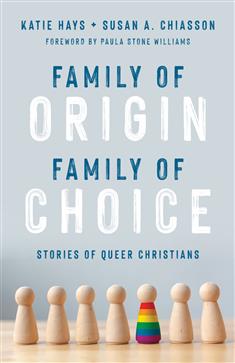Book Reveiw: Family of Origin, Family of Choice by Katie Hays and Susan Chiasson
Familial relationships and faith can be difficult to maintain and balance – especially, as Katie Hays and Susan Chiasson lay out in this book, if you’re an LGBTQ+ individual. Family of Origin, Family of Choice: Stories of Queer Christians paints a complex picture of how familial relationships change when someone comes out as well as how (specifically Christian) faith plays into acceptance and rejection.

The collection of experiences, while small in number, cover larger swaths of the LGBTQ+ spectrum than I would have expected from a book of fewer than 150 pages. Some testimonies are gay/lesbian, some are trans, and some identify as non-binary or genderqueer; interviewees are those who’ve been unsure of their sexuality for 50+ years (and still somewhat in the closet) as well as those who’ve known since they were teens and have been out ever since. Reflections and interviews from some of their parents encompass the flip side of the narrative, when close family can find their loyalties divided between other relatives and their children. A solid 75 to 80% of the book is intended to be as direct of a transcript as possible, letting the candid stories and experiences speak for themselves.
What makes the text unique is its additional focus on faith, specifically in the Christian church. One gay interviewee is in seminary; several others have pastors or strong Christian roots in their familial background. Some of their church-going family members had strong negative reactions to their coming out announcements; others, sometimes to the surprise of the interviewees telling their stories, reacted with love in ways they hadn’t anticipated. Sometimes the faith of all those involved opens doors for better relationships after coming out, and sometimes it closes them in ways that still hurts those giving the testimonies. Perhaps most importantly: interviewees all saw themselves in a place where their Christian faith and their identity weren’t in conflict, and they felt they had reached a state of equilibrium with their wellbeing, their familial relationships (or lack thereof), and their spiritual beliefs.
My biggest concern, when reading this, is that Hays and Chiasson are both straight, cisgender women. While it sounds as though they did their best to remove any traces of their own influence on the testimonies they collected, I’m conscious that their perspective may have unintentionally impacted the conversations in different ways than LGBTQ+ interviewers would have. Chiasson, as a social scientist, provides a “road map” for coming out in her portion of the closing, but in that process, she refers back to the interviews and points out the broad variety of experiences the interviewees all had; this is the closest the authors come to taking over the text, rather than having the interviewees experiences shine through, and I did appreciate that nowhere else did the interviewees or authors imply that coming out is a “one size fits all” experience.
If you’re interested in hearing these perspectives on sexuality and gender identity – or if you think these experiences might resonate with you – you can check out Family of Origin, Family of Choice at the Charles City Public Library. Call 641-257-6319 or stop in today to reserve our copy.
Reveiwed by Kamryn Kronschnobel, Patron Services Librarian